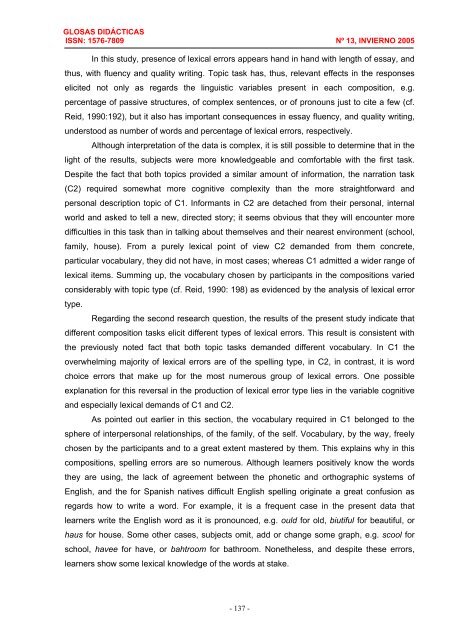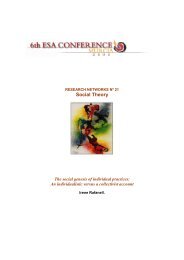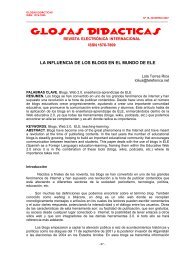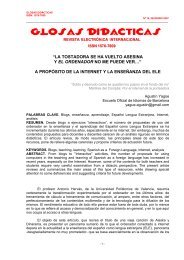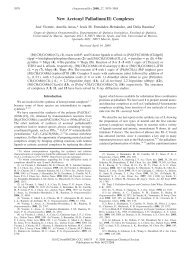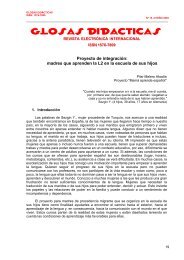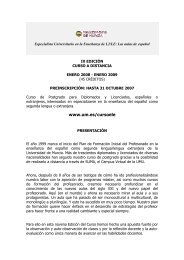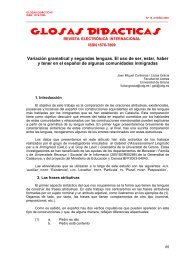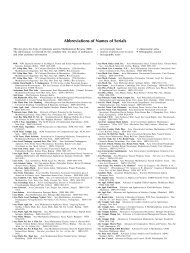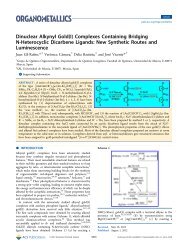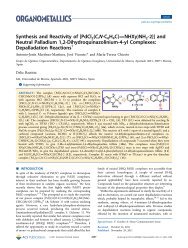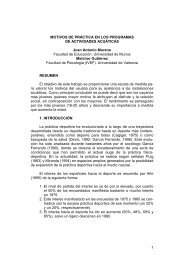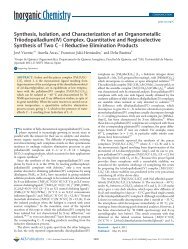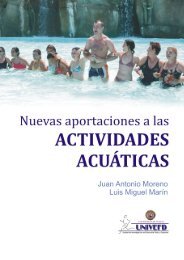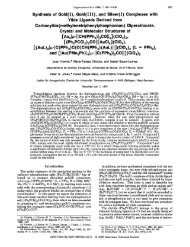descarga del número 13 de glosas didácticas completo
descarga del número 13 de glosas didácticas completo
descarga del número 13 de glosas didácticas completo
You also want an ePaper? Increase the reach of your titles
YUMPU automatically turns print PDFs into web optimized ePapers that Google loves.
GLOSAS DIDÁCTICAS<br />
ISSN: 1576-7809 Nº <strong>13</strong>, INVIERNO 2005<br />
In this study, presence of lexical errors appears hand in hand with length of essay, and<br />
thus, with fluency and quality writing. Topic task has, thus, relevant effects in the responses<br />
elicited not only as regards the linguistic variables present in each composition, e.g.<br />
percentage of passive structures, of complex sentences, or of pronouns just to cite a few (cf.<br />
Reid, 1990:192), but it also has important consequences in essay fluency, and quality writing,<br />
un<strong>de</strong>rstood as number of words and percentage of lexical errors, respectively.<br />
Although interpretation of the data is complex, it is still possible to <strong>de</strong>termine that in the<br />
light of the results, subjects were more knowledgeable and comfortable with the first task.<br />
Despite the fact that both topics provi<strong>de</strong>d a similar amount of information, the narration task<br />
(C2) required somewhat more cognitive complexity than the more straightforward and<br />
personal <strong>de</strong>scription topic of C1. Informants in C2 are <strong>de</strong>tached from their personal, internal<br />
world and asked to tell a new, directed story; it seems obvious that they will encounter more<br />
difficulties in this task than in talking about themselves and their nearest environment (school,<br />
family, house). From a purely lexical point of view C2 <strong>de</strong>man<strong>de</strong>d from them concrete,<br />
particular vocabulary, they did not have, in most cases; whereas C1 admitted a wi<strong>de</strong>r range of<br />
lexical items. Summing up, the vocabulary chosen by participants in the compositions varied<br />
consi<strong>de</strong>rably with topic type (cf. Reid, 1990: 198) as evi<strong>de</strong>nced by the analysis of lexical error<br />
type.<br />
Regarding the second research question, the results of the present study indicate that<br />
different composition tasks elicit different types of lexical errors. This result is consistent with<br />
the previously noted fact that both topic tasks <strong>de</strong>man<strong>de</strong>d different vocabulary. In C1 the<br />
overwhelming majority of lexical errors are of the spelling type, in C2, in contrast, it is word<br />
choice errors that make up for the most numerous group of lexical errors. One possible<br />
explanation for this reversal in the production of lexical error type lies in the variable cognitive<br />
and especially lexical <strong>de</strong>mands of C1 and C2.<br />
As pointed out earlier in this section, the vocabulary required in C1 belonged to the<br />
sphere of interpersonal relationships, of the family, of the self. Vocabulary, by the way, freely<br />
chosen by the participants and to a great extent mastered by them. This explains why in this<br />
compositions, spelling errors are so numerous. Although learners positively know the words<br />
they are using, the lack of agreement between the phonetic and orthographic systems of<br />
English, and the for Spanish natives difficult English spelling originate a great confusion as<br />
regards how to write a word. For example, it is a frequent case in the present data that<br />
learners write the English word as it is pronounced, e.g. ould for old, biutiful for beautiful, or<br />
haus for house. Some other cases, subjects omit, add or change some graph, e.g. scool for<br />
school, havee for have, or bahtroom for bathroom. Nonetheless, and <strong>de</strong>spite these errors,<br />
learners show some lexical knowledge of the words at stake.<br />
- <strong>13</strong>7 -


